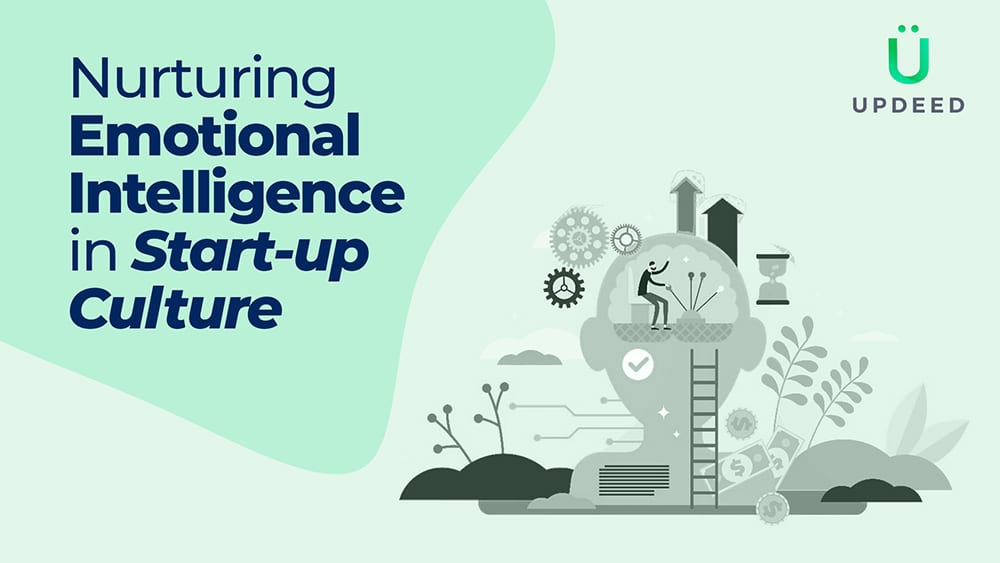Nurturing Emotional Intelligence in Start-up Culture
In a start-up’s fast-paced and competitive world, success goes beyond having a groundbreaking idea or a stellar business plan. The ability to navigate challenges, build strong relationships, and make sound decisions is crucial.
This is where emotional intelligence (EI) comes into play.
Nurturing emotional intelligence in start-up culture is essential for fostering a supportive and thriving environment. There is a need to explore the
significance of emotional intelligence in the start-up ecosystem and provide practical strategies for cultivating EI skills among entrepreneurs and team members.

Understanding Emotional Intelligence
Emotional intelligence encompasses a range of skills, including self-awareness, self-regulation, empathy, and effective interpersonal communication. It involves recognising and understanding one’s emotions and those of others, managing emotions effectively, and using emotional information to guide behaviour and decision-making.
Now, the thing to ponder upon is the importance of emotional intelligence in startups.
High-pressure situations, uncertainty, and rapid changes often characterise start-ups. In this context, emotional intelligence becomes even more critical. Here are some key reasons why nurturing emotional intelligence is crucial in the start-up culture:
- Effective Leadership: Emotional intelligence enables leaders to understand and connect with their team members deeply. Emotionally intelligent leaders can inspire trust, motivate their team, and effectively navigate challenges.
- Team Collaboration: Start-ups thrive on collaboration and teamwork. Emotional intelligence helps team members build strong relationships, communicate effectively, resolve conflicts, and collaborate towards shared goals.
- Resilience and adaptability: Start-ups face numerous setbacks and obstacles. Emotional intelligence allows individuals to bounce back from failures, adapt to changing circumstances, and maintain a positive mindset, fostering resilience within the start-up culture.
- Decision-making: Emotional intelligence enhances decision-making by considering both rational and emotional factors. It helps entrepreneurs weigh different perspectives, manage biases, and make well-informed decisions that align with the company’s vision.
Nurturing Emotional Intelligence in Start-up Culture
To cultivate emotional intelligence in the start-up culture, here are some practical strategies:
Self-awareness: Encourage self-reflection and self-awareness among team members. This can be done through activities like journaling, mindfulness exercises, or seeking feedback from peers.
Emotional regulation: Provide tools and resources to help individuals manage their
emotions effectively. This may include stress management techniques, mindfulness training, or offering support systems like counselling or coaching.
Empathy and active listening: Foster a culture of empathy by encouraging active listening and understanding others’ perspectives. Promote open communication and constructive feedback and create spaces for genuine dialogue.
Emotional Intelligence Training: Offer workshops or training programs on emotional intelligence development. These sessions can cover emotional awareness, empathy, conflict resolution, and effective communication.
Lead by example: Leaders should model emotionally intelligent behaviour and create an inclusive and supportive work environment. By demonstrating empathy, emotional regulation, and effective communication, leaders inspire others to follow suit.
Encourage collaboration and feedback: Foster a collaborative culture where team members feel comfortable sharing ideas, providing feedback, and offering support to one another. Regular team-building activities, brainstorming sessions, and peer-to-peer feedback mechanisms can facilitate this process.
Celebrate successes and learn from failures: Acknowledge and celebrate big and small
achievements to create a positive work environment. Similarly, encourage learning from failures by fostering a growth mindset and viewing setbacks as opportunities for growth and improvement.
Conclusion
Emotional intelligence is a vital ingredient for success in the start-up culture. By nurturing emotional intelligence skills, entrepreneurs and team members can enhance their leadership abilities, strengthen teamwork, and make informed decisions.
Emphasising EI in the start-up ecosystem creates a supportive and resilient environment, enabling individual teams to thrive amidst challenges and uncertainties. As the start-up landscape continues to evolve, it is crucial to prioritise the development of emotional intelligence. By implementing the abovementioned strategies, start-ups can create a culture that fosters self-awareness, empathy, effective communication, and collaboration. This, in turn, will lead to improved decision-making, enhanced team dynamics, and increased overall performance.
Moreover, nurturing emotional intelligence goes beyond individual growth; it contributes to the long-term success and sustainability of the start-up itself. Start-ups with emotionally intelligent leaders and teams are more likely to attract and retain top talent, build strong partnerships, and establish a positive brand reputation.
Ready to make a positive impact in the world?
UPDEED is the place for you. Our free and open platform is filled with inspiring stories from individuals and organizations who are making a difference in their communities and beyond. Connect and collaborate with like-minded individuals from around the globe on UPDEED, and discover your own potential to create meaningful change. Join our community and make a difference.





